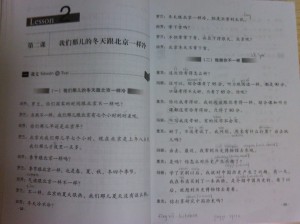November 4, 2010
When I graduated from college in 2008, I bid farewell to academics. I felt no qualms about closing the chapter on late nights and libraries; instead, I eagerly anticipated the time that was to be free of studies.
A few weeks ago, however, I willingly relinquished my ex-student status. Driven by a determination to seriously improve my Mandarin, I met with a representative from one of Shanghai’s countless language programs. She quickly assessed my level, then assigned me my first teacher in two years: Pan.
Pan is a graduate student at Fudan University (复旦大学), one of the nation’s top institutions. Though he took on this tutoring job to make some extra pocket money, he does seem genuinely invested in my academic and cultural improvements. He happily composes reading passages (to supplement the curriculum’s standard textbook, pictured below) that are tailored to my weaknesses, then sends text messages to ensure my comprehension; he even invited me to a Fudan University campus tour and dinner with his classmates, in an effort to increase my immersion.
I meet with Pan for two hours, twice a week. Since I’m incessantly encountering new scenarios that demand a high level of Mandarin comprehension, I’m confident that my motivation will continue for the remaining two months of sessions. If so, this is sure to be a productive undertaking.
I know that developing my language skills will further enhance my experiences here. As of now, I can sit in a restaurant and briefly speak to the locals about teaching, food, and the weather. However, it’s a stressful experience: I often have to frantically consult my Blackberry’s Mandarin dictionary under the table, just to make sure I’m following along correctly. I can’t wait for the day when I can casually engage in a truly meaningful conversation. After all, speaking with the people of a country may be the best way to truly know a country. It takes an outsider light years beyond the level of reading and following a travel guide.
This same outlook encourages me as I enter the Chinese students’ classrooms each day. It is easy for me and my friends to become completely distracted by the weeknight bar scenes and weekend traveling destinations. In fact, these are the primary incentives for many of the foreign teachers who make the journey to China. As a result, I have to constantly remind myself that there is also an important job to be done here: learning English may empower these adorable students in the future paths that they themselves take.
I spend most days supervising English classes, then sharing my feedback with the teachers I’ve observed. I’m also responsible for revising lesson plans and conducting weekly teacher trainings. These administrative duties are definitely a change of pace from my past two years in a school setting, but I do value the experience. Not only am I partaking in a completely different component of the education system, but I am also allowed the opportunity to interact on a firsthand basis with the Chinese administrators and employees of our program.
This interaction has facilitated my direct exposure to cultural clashes of the workplace. While the views and actions of the people in my office aren’t necessarily representative of the general Chinese mindset, they certainly differ from what the foreigners and I are accustomed to…
– Our employers generally hesitate to share constructive criticism. They view such feedback as crass and impolite; instead, they believe that we should independently recognize our flaws. This is a difficult approach in any situation, as it’s simply impossible to improve without the awareness that a problem exists. Furthermore, many of our teachers have no prior experience: pointed advice is crucial for a novice in any field.
– A similar approach is taken when requests are made. Rather than explicitly instructing us to substitute for an absent teacher or modify our weekend schedules, our boss merely says “I’d really appreciate your support when…”. To the average American, this phrasing implies that you have a choice in the matter. To the average Chinese employer in our office, however, your choice is clear: say no, and you will risk losing their respect or your job (One glaringly negative consequence of this arrangement is the fact that our teaching schedules are unpredictable and inconsistent. While many teachers enjoy a regular Saturday/Sunday weekend, others have Thursday/Friday off; my weekends currently fall on Sunday/Monday).
– Discussions of money, whether in terms of overtime paychecks or bill reimbursements, are also considered highly offensive. However, since these funds determine our social lives and travel plans, we are understandably curious about any delays that occur.
– On the other hand, topics that we tend to consider unmentionable are entirely acceptable. During one of my school visits, I watched a Chinese teacher ask Jami, the foreign teacher, to send the students to be weighed by the school nurse. When Jami sent out the entire class in a line, the Chinese teacher quickly ushered them back in. She explained to Jami, “Not all of them. We only want the fat ones.” The three chubbiest students immediately stood up and walked to the door, confirming that this was not the first time they had been afflicted with the “fat one” label. I was shocked by this incident, especially due to the fact that these students are just six years old.
– Physical differences also play a role in the employees’ daily lives, as different standards seem to apply to different genders. The girls are often chastised when they show up late or call out sick, while the boys are simply welcomed warmly or reminded to take care of themselves. This presents a confusing and seemingly unfair situation, especially for Americans who are fond of and accustomed to gender equality.
As with all stories, though, there is not only one side. I can guarantee that we do and say many things that baffle, or even offend, our Chinese employers.
Fortunately or unfortunately, we are on their turf. A wise man’s Facebook profile once read: 入乡随俗 (When in Rome, do as the Romans do). In other words: we must endure our stumbles, learn from them, and move on with newly acquired understandings.
This is not always an easy or gracious process. Sometimes, it is simply impossible to dial down our ethnocentric frustrations: “Can’t you just tell me that this meeting is mandatory?!” “Where is my money?!” “Why can he be late?!” However, as I first learned during the visa struggles I encountered before my departure, it is futile to expect 1.4 billion people to change for our benefit. We can only do our best to open our minds and evenly handle conflicts.
And, when all else fails, we can focus on the most positive aspect of our jobs: location, location, location.






Nat Nat! I’m soooo proud of you!! I miss you lots! Keep up the good work and I love reading your updates!
How insightful! 你应该写一本小说!加油!
love love this post. maybe because i am mentioned? totally kidding! but, i was talking to my mom (while reading your post, lol) and she died about the fat kids comment! i totally forgot about that! thank you for reminding me. i will probably just copy and paste that?? ok, thanks. haha 🙂